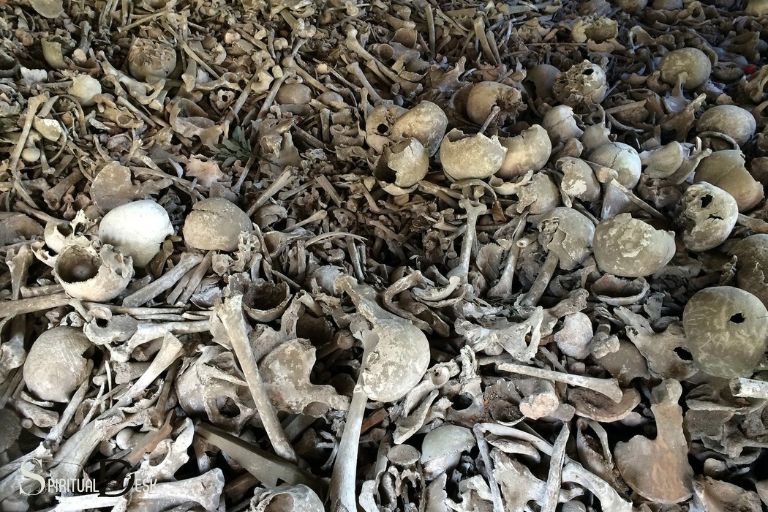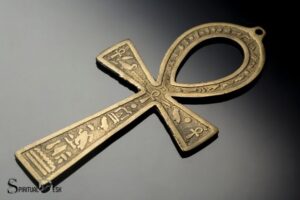What is the Spiritual Meaning of Bones in the Bible? Fixity
The spiritual meaning of bones in the Bible represents strength, stability, and structure, often signifying our innermost beliefs and foundation.
The symbolism of bones can be found throughout the Bible, illustrating various themes such as life, death, and resurrection.
The spiritual significance of bones in the Bible encompasses a variety of themes and concepts that revolve around human existence, inner strength, and unwavering faith in God.
By understanding the symbolism of bones, we can better appreciate the depth of Biblical teachings and apply them to our spiritual journey.
7 References: Spiritual Meanings of Bones in the Bible
| Reference | Verse | Spiritual Meaning of Bones |
|---|---|---|
| Ezekiel 37:1-14 | The Valley of Dry Bones | The vision of the dry bones coming to life symbolizes the restoration of Israel and the spiritual revival of the people. |
| Proverbs 17:22 | A cheerful heart is good medicine, but a broken spirit dries up the bones. | Bones represent the innermost strength and spiritual health of a person. A broken spirit leads to weakened spiritual health. |
| Proverbs 15:30 | The light of the eyes rejoices the heart, and good news refreshes the bones. | Bones symbolize the inner spiritual strength, and when they are refreshed, it signifies the renewal and invigoration of the spirit. |
| Psalm 51:8 | Let me hear joy and gladness; let the bones you have crushed rejoice. | In this verse, crushed bones represent the feeling of being broken and humbled before God, seeking forgiveness and restoration. |
| Genesis 2:23 | Then the man said, “This at last is bone of my bones and flesh of my flesh; she shall be called Woman, because she was taken out of Man.” | The spiritual meaning of bones here represents unity, connection, and relationship between man and woman, as they share the same origin. |
| 2 Kings 13:21 | As soon as the man touched the bones of Elisha, he was revived and stood on his feet. | The bones of Elisha symbolize the power of God’s prophetic word and the ability to bring life to what was once dead. |
| Job 10:11 | You clothed me with skin and flesh, and knit me together with bones and sinews. | Bones symbolize the structure, stability, and strength that God provides in creating human beings. |
Key Takeaway

Five Facts About: The Spiritual Meaning of Bones in the Bible
Understanding The Symbolism Of Bones In Biblical Context
In the bible, bones hold a significant spiritual meaning that goes beyond their physicality. They are often used as metaphors and symbols to convey deep spiritual truths and teachings.
Let’s delve into the importance of bones in the biblical narrative and explore the connection between bones and the essence of life.
Importance Of Bones In Biblical Narrative
- Bones serve as a reminder of mortality and the fleeting nature of life, highlighting the need for spiritual redemption and salvation.
- The bones of the deceased are a reminder of the dead and evoke emotions of grief, reflecting the human experience of loss and mourning.
- Bones are associated with strength and resilience, as they are the framework that provides support and stability to the human body.
- The resurrection of jesus christ is a powerful biblical event that further amplifies the significance of bones, representing the triumph over death and the promise of eternal life.
Connection Between Bones And The Essence Of Life
- Bones are intricately connected to the essence of life, as they house the vital marrow that produces blood cells necessary for sustenance.
- Bones symbolize the core of our being, representing our identity and individuality, as they provide the framework for our physical form.
- The symbolism of dry bones in the bible, such as in the story of ezekiel’s vision, signifies spiritual desolation and the need for divine intervention to bring about restoration and renewal.
- Bones are also associated with resurrection and new life. In the book of job, job expresses his hope for a future resurrection by declaring, “i know that my redeemer lives, and that in the end he will stand on the earth. And after my skin has been destroyed, yet in my flesh i will see god” (job 19: 25-26).
Understanding the spiritual meaning of bones in the bible enhances our comprehension of scriptural teachings and allows us to grasp the depth of symbolism employed.
It reminds us of our mortality, the importance of redemption, and the promise of eternal life through faith.
The connection between bones and the essence of life adds a profound layer of significance to our understanding of the human experience and our spiritual journey.
Bones As A Symbol Of Creation And Resurrection
Bones hold a special significance in the bible, representing various spiritual concepts. One of the key spiritual meanings attributed to bones is their association with creation and resurrection.
Throughout the bible, bones are used symbolically to convey profound messages about god’s power and the restoration of life.
Let’s explore two significant instances where bones are used in this context.
Significance Of Bones In The Creation Of Adam And Eve
- God crafted adam from the dust of the ground, forming the basic structure of his body. However, it was when god breathed the breath of life into adam’s nostrils that he became a living being.
- Adam’s creation from dust highlights the idea that bones, being the framework of our physical bodies, signify the structure and form given by god to humanity.
- The reference to bones indicates the vital role they play in the creation and sustenance of life. It reminds us that god intricately designed our bodies, with bones serving as the foundation of our existence.
Symbolism Of The Valley Of Dry Bones In Ezekiel’s Vision
- In the book of ezekiel, the prophet has a vision of a valley filled with dry bones. These bones represent the people of israel who had lost hope and felt spiritually dead.
- The significance lies in the fact that god asks ezekiel whether these bones can live again. Through this vision, god conveys the message that just as he can bring life back to dry bones, he can revive the spiritual life of his people.
- The vision serves as a powerful symbol of resurrection and restoration. It reminds us that no matter how lifeless or hopeless a situation may seem, god has the power to breathe new life into it.
- This vision also points towards the ultimate resurrection promised in the bible, where all believers will be raised to eternal life.
By examining the spiritual meaning of bones in the bible, we gain a deeper understanding of god’s creative power and his ability to bring life out of what may seem lifeless.
The use of bones as symbols of creation and resurrection serves as a reminder of god’s constant presence in shaping and renewing our lives.
So, let us embrace the significance of bones and the faith they inspire in the miraculous work of god.
Bones As A Symbol Of Strength And Protection
David And Goliath: The Power Of Bones In Battle
In the biblical story of david and goliath, we see a powerful example of how bones can symbolize strength and protection in battle.
Here’s how this story highlights the significance of bones:
David’s choice of weapon: When facing the formidable giant goliath, david decided to use a sling and stones as his weapon.
This unconventional choice highlights the contrast between the strength and might of goliath’s physical body and the inner strength and courage represented by david’s bones.
David’s faith and trust in god: Before facing goliath on the battlefield, david proclaims his unwavering trust in god’s protection. In psalm 3:7-8, he says, “arise, lord!
Deliver me, my god! Strike all my enemies on the jaw; break the teeth of the wicked…from the lord comes deliverance.”
This demonstrates how the bones, symbolizing the core of one’s being, can serve as a source of confidence and reliance on a higher power.
The downfall of goliath: With a swift strike, david uses his sling to launch a stone that hits goliath in the forehead. This blow is powerful enough to not only knock the giant down but also proves fatal.
It symbolizes the idea that although bones may seem fragile compared to flesh and muscle, they can carry the strength to defeat even the mightiest adversaries.
Biblical References To Bones As A Source Of Protection
Beyond the story of david and goliath, the bible contains numerous references to bones representing protection and safety.
Here are a few notable examples:
Psalm 34: 20: “he protects all his bones; not one of them will be broken.” This verse speaks to the idea that even in times of hardship and danger, god provides a shield of protection to safeguard his people.
Proverbs 3: 7-8: “do not be wise in your own eyes; fear the lord and shun evil. This will bring health to your body and nourishment to your bones.”
This passage suggests that following a righteous path and living in accordance with god’s teachings can lead to physical well-being and a sense of protection.
Ezekiel 37: 7-8: “i will attach tendons to you and make flesh come upon you and cover you with skin; i will put breath in you, and you will come to life.
Then you will know that i am the lord.” In this prophetic vision, bones represent a foundation upon which restoration and revival can occur, emphasizing the spiritual protection and sustenance provided by god.
By examining these biblical references, we can appreciate how bones symbolize strength, courage, and divine protection.
They remind us that our true power lies not in physical attributes but in the faith and trust we place in a higher power.
Bones As A Symbol Of Remembrance And Identity
Bones hold significant spiritual meaning in the bible, representing more than just physical remnants of the deceased.
They are often seen as a symbol of remembrance and identity, serving as a connection to the past and a reminder of who we are.
Let’s explore the rituals surrounding burial and bone preservation, as well as how bones are used to honor ancestors and maintain heritage.
Rituals Surrounding Burial And Bone Preservation:
- Burial practices: In biblical times, burials were an important aspect of honoring the deceased. Proper burial was seen as a sign of respect and a way to ensure the deceased found rest in the afterlife.
- Bone preservation: The preservation of bones played a significant role in several biblical rituals. The practice of collecting and preserving bones honored the deceased and kept their memory alive for generations to come.
- Bone gathering: In certain instances, bones were gathered and placed in ossuaries, special containers used for bone preservation. This allowed families to keep their ancestors close and maintain a connection to their heritage.
Bones As A Way To Honor Ancestors And Maintain Heritage:
- Ancestor veneration: The bible emphasizes the importance of honoring one’s ancestors, and bones were often used as a means of remembrance. It was considered a spiritual duty to give proper respect and maintain a connection with the deceased.
- Genealogy and heritage: Bones served as a tangible link to one’s ancestry. They were a physical reminder of the family lineage and roots, allowing individuals to understand their heritage and cultural identity.
- Continuity and identity: The preservation of bones helped maintain a sense of continuity across generations. It ensured that the legacy of ancestors lived on and contributed to the collective identity of the community.
By understanding the spiritual meaning of bones in the bible, we can appreciate their significance in the realms of remembrance and identity.
The rituals surrounding burial and bone preservation, as well as the practice of honoring ancestors and maintaining heritage, remind us of the importance of staying connected to our roots and preserving the memories of our past.
Bones As A Symbol Of Transformation And Spiritual Growth
Bones hold a significant place in the spiritual realm, particularly in the bible, serving as powerful symbols of transformation and spiritual growth.
These skeletal structures embody the concept of rebirth and renewal, as well as the restoration and strengthening of faith.
Let’s explore the spiritual meaning of bones and their association with these transformative aspects.
The Concept Of Rebirth And Spiritual Transformation
- Bones signify the notion of rebirth and spiritual transformation, representing the potential for a fresh start and growth in one’s faith.
- Just as bones undergo a process of renewal in the physical body, the spiritual journey involves shedding old beliefs and embracing new ones.
- The bible often uses bones as a metaphor for spiritual awakening and the restoration of the soul.
- Through spiritual transformation, individuals experience a metamorphosis in their character, attitudes, and perspectives, allowing them to embrace new beginnings and spiritual growth.
Bones As A Representation Of The Renewal Of Faith
- Bones symbolize the renewal of faith, emphasizing the importance of continuous spiritual development and growth.
- In times of doubt or spiritual dryness, the concept of bones can serve as a reminder of the need to revive and strengthen one’s faith.
- Just as bones are essential for the support and structure of the body, faith acts as a foundation for a person’s spiritual journey.
- The renewal of faith involves deepening one’s understanding and connection with god, resulting in a stronger and more resilient spiritual life.
Spiritual Growth As A Transformative Process
- Spiritual growth refers to the continuous development and maturation of one’s faith, fostering a closer relationship with god and aligning one’s life with his teachings.
- Bones embody the transformative process of spiritual growth, reminding individuals of the need to nurture and cultivate their faith regularly.
- This growth involves practices such as prayer, study of scripture, meditation, and acts of service, which contribute to a deeper understanding of oneself and god.
- Just as bones become stronger with the right nutrition and exercise, spiritual growth requires intentional efforts and discipline to thrive.
Bones hold great spiritual significance in the bible as symbols of transformation and spiritual growth. They represent the concept of rebirth and the renewal of faith, encouraging individuals to embrace new beginnings and continuously nurture their spiritual journey.
Through this transformative process, individuals can experience a deeper connection with god and a stronger foundation for their faith.
FAQ About the Spiritual Meaning Of Bones In The Bible
What Is The Significance Of Bones In The Bible?
Bones hold symbolic meaning in the bible, representing strength, resurrection, and the core of a person’s being.
How Does The Bible Use Bones Symbolically?
The bible uses bones symbolically to illustrate various themes such as life, death, restoration, and the power of god’s word.
What Does The Valley Of Dry Bones Represent?
The valley of dry bones, mentioned in the book of ezekiel, represents a state of spiritual death and god’s ability to resurrect and restore.
What Do Bones Symbolize In Spiritual Practices?
In spiritual practices, bones symbolize ancestral wisdom, connection to the divine, and the power to heal and transform.
How Can Understanding The Spiritual Meaning Of Bones Enhance Our Faith?
Understanding the spiritual meaning of bones helps deepen our faith by revealing powerful symbols and lessons that can inspire and guide us in our spiritual journey.
Conclusion
The spiritual meaning of bones in the bible is rich and significant. Bones symbolize various aspects such as strength, resurrection, and the foundation of faith.
From the creation story of adam to the resurrection of jesus, bones serve as a reminder of god’s power and the promises he has made.
They represent the physical and spiritual aspects of humanity, connecting the mortal with the divine.
Throughout the bible, bones are used to convey important messages and teachings, emphasizing the importance of faith and resurrection.
Understanding the spiritual significance of bones can deepen our understanding of god’s plan for salvation and his presence in our lives.
By recognizing the profound meaning behind bones in the bible, we can gain a greater appreciation for the spiritual lessons and truths that they convey.
May this insight enrich your journey of faith and inspire you to seek a deeper connection with the divine.
Bonus: The Spiritual Meaning of Bones in the Bible
What Does Bone Symbolize In The Bible?
In the Bible, bones generally symbolize death and resurrection. This is because they are the hardest part of the human body and the last to decompose after death. In some cases, bones may also symbolize strength, power, and durability.
What Is The Meaning Of Bones Spiritually?
There are many different interpretations of what bones can mean spiritually.
Ultimately, the meaning of bones spiritually will depend on your own beliefs and experiences. However, you choose to interpret them, remember that they can be a source of strength, wisdom, and power.
What Does God Say About Bones?
In the Bible, God often uses bones to symbolize something that is strong and lasting.
For example, in the story of Joseph and his brothers, Joseph’s bones were buried in Egypt when he died, symbolizing how his legacy would last even after he was gone.
In the book of Revelation, the city of Babylon is described as being made of “golden pipes full of incense�and with her smoke rose up forever and ever.”
This symbolism is used to describe how powerful and permanent Babylon’s influence will be. God also uses bones to represent His own power and strength.
In Ezekiel 37, God brings dry bones back to life, showing His control over life and death.
And in Psalm 102:25-26, God says that He will “lay [the] foundation [of the earth] on its holy mountains,” using bones as a metaphor for something that is strong and unshakable.
So what does all this mean for us? Well, first off, it shows us that God is interested in our physical well-being.
He wants us to have strong bodies that will last a lifetime. But more importantly, it shows us that God is interested in our spiritual well-being. He wants our faith to be strong and lasting too.
What Do Proverbs Say About Bones?
Proverbs 12:18 says, “There is one who speaks rashly like the thrusts of a sword, but the tongue of the wise brings healing.” This verse is often read in reference to gossip or slander, and how harmful words can be.
However, the word “rashly” can also be translated as “carelessly,” and in this context, the verse is teaching that careless words can hurt just as much as intentional ones.
This principle is seen throughout Proverbs. In chapter 15, verses 4 and 5 say, “A gentle tongue [is] a tree of life, but perverseness in it [is] a breakage of the spirit.
A fool despises his father’s instruction, but he who regards reproof is prudent.” Here we see that wise words bring life (both physical and spiritual), while foolish words break the spirit.
And in chapter 25, verses 11 and 12 tell us that “A word fitly spoken is like apples of gold in settings of silver.
Like an earring of gold or an ornament of fine gold is a wise rebuker to an ear that listens.” Again, we see that rebuke (or correction) from a wise person is precious and should be treasured.
Spiritual Meaning Of Dry Bones
The spiritual meaning of dry bones is that they represent death, both physical and spiritual. They also symbolize the end of something, such as a relationship or a way of life.
When you see dry bones in your dreams or visions, it is important to pay attention to the other symbols in the dream or vision to determine what the overall message may be.
Dry bones can also indicate a need for change or transformation in your life. If you feel like you are stuck in a rut, the appearance of dry bones can be a sign that it is time to make some changes.
This can be difficult, but it is often necessary in order to move forward on your spiritual journey. Trust that the changes you need to make will lead you to a better place.
Bones Spiritual Symbolism
Bones are often seen as a spiritual symbol. They represent the structure and support of our physical bodies, as well as the foundation of who we are.
Bones also remind us of our own mortality and can be a reminder to live our lives to the fullest.
In many cultures, bones are seen as sacred objects. They are often used in ceremonies and rituals and are believed to hold great power.
For example, in Native American culture, bones are often used in healing ceremonies.
They are also believed to protect against evil spirits. Bones can also be symbols of strength and resilience. They remind us that even though we may be broken at times, we can always rebuild ourselves stronger than before.
Spiritual Meaning Of Chicken Bone
When most people think of chicken bones, they probably don�t think much beyond the culinary uses. However, chicken bones actually have a long history of spiritual and cultural significance.
In many cultures, chicken bones are seen as lucky charms or talismans.
They�re also often used in rituals and spells. So what is the spiritual meaning of chicken bones? There are actually a few different interpretations.
Some believe that chicken bones represent protection and good luck. Others see them as a symbol of fertility or new beginnings. And still, others believe that chicken bones have the power to ward off evil spirits.
No matter what your beliefs are, there�s no denying that chicken bones have a deep and meaningful history.
If you find yourself with a few extra chicken bones, don�t throw them away! Consider giving them a place of honor in your home � who knows, they just might bring you some good luck.
Meaning Of Broken Bones In the Bible
There are many references to broken bones in the Bible, both in the Old and New Testaments. In most cases, these references are figurative, meaning that they are symbolic of something else.
However, there are a few instances where broken bones are mentioned literally.
The most famous example of a literal broken bone is when Jesus was crucified. The Gospel of John says that when the soldiers came to break his legs (a standard practice during the crucifixion), they found that he was already dead.
To make sure he was truly dead, one of the soldiers pierced his side with a spear, and blood and water flowed out (John 19:33-34). This event is significant because it shows that Jesus really did die on the cross.
His bones were not just broken symbolically; they were actually physically broken. This proves that he really did suffer and die for our sins, as he said he would (Matthew 26:28).
Another literal reference to broken bones occurs in Exodus 12:46. Here, God gives instructions for how to prepare Passover lamb. He says that none of its bones should be broken (Exodus 12:46).
This is significant because it shows that the lamb must be completely perfect in order to be sacrificed. It also foreshadows Jesus, who would later become the ultimate sacrificial lamb whose perfect body would not have a single bone broken(John 19:36).
Finally, there are numerous references to broken bones in Scripture as a figure of speech or metaphor.
For instance, Psalm 34:20 says that �He keeps all their bones; not one of them will be broken.” This is referring to God’s protection over His people.
Just as He protects us from physical harm, He also protects us from spiritual harm (such as sin). Similarly, Psalm 51:8 says �Let me hear joy and gladness;
let the Bones You have crushed rejoice.” Here David is asking God for forgiveness and restoration after his sin with Bathsheba.
He recognizes that his sin has caused him much pain and grief (symbolized by “crushed” bones), but he knows that God can heal him and make him whole again if he repents (turns away from his sin).
Whether taken literally or figuratively, references to broken bones in Scripture often point to some greater truth about God or His plan for our lives.






